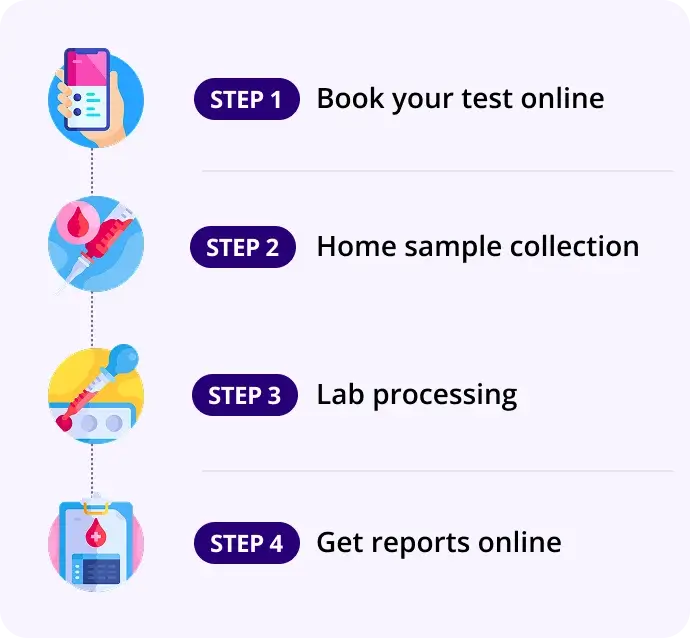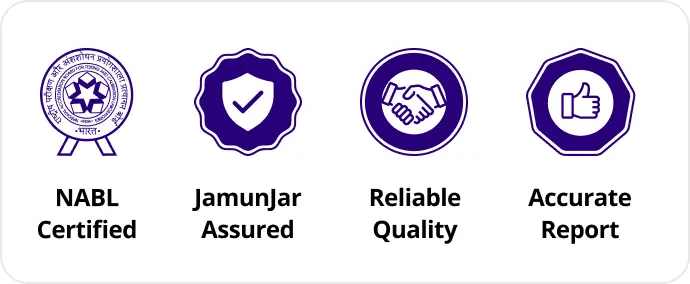Search for
Protein C Activity
Hormone/ Element
Report in 48Hrs
At Home
No Fasting Required
Details
Measures the functional activity of Protein C in the blood, assessing its ability to regulate clot formation
₹3,750₹5,350
30% OFF
FREE:
Ai Insights
|Home pickup
Protein C Activity Test - Comprehensive Medical Guide
- Why is it done?
- Measures functional activity of Protein C, a natural anticoagulant protein that helps prevent excessive blood clotting by inactivating blood clotting factors V and VIII
- Ordered to evaluate patients with personal or family history of blood clots (thrombosis or thromboembolism)
- Used to diagnose Protein C deficiency, a hereditary or acquired clotting disorder that increases risk of venous thromboembolism, deep vein thrombosis (DVT), and pulmonary embolism (PE)
- Performed during evaluation of recurrent unexplained thrombosis or thrombosis in unusual sites (mesenteric, cerebral, or portal veins)
- Indicated in patients with warfarin-induced skin necrosis to assess for underlying Protein C deficiency
- Used to monitor patients with known Protein C deficiency or those on anticoagulation therapy
- Normal Range
- Normal Range: 70-130% of normal activity (or 70-130 IU/mL)
- Units of Measurement: Percentage (%) of normal activity or International Units per milliliter (IU/mL)
- Result Interpretation:
- Normal result (70-130%): Adequate Protein C activity; normal anticoagulant function; low risk for thrombosis related to Protein C deficiency
- Low result (<70%): Suggests Protein C deficiency; increased risk for thrombotic events; may indicate Type I (quantitative) or Type II (qualitative) deficiency
- Borderline result (60-70%): Warrants further testing and clinical correlation; may require family screening
- Significantly elevated result (>130%): Rarely clinically significant; unlikely to represent true elevation in activity
- Laboratory Variation: Reference ranges may vary slightly between laboratories; consult laboratory report for specific reference values
- Interpretation
- Low Protein C Activity (<70%):
- Indicates Type I or II Protein C deficiency; both hereditary and acquired causes possible; associated with hypercoagulable state and increased thrombotic risk
- Hereditary Protein C Deficiency:
- Autosomal dominant condition; heterozygous individuals have ~50% activity; homozygous individuals have <10% activity with severe thrombotic manifestations
- Acquired Protein C Deficiency:
- May occur with liver disease, vitamin K deficiency, disseminated intravascular coagulation (DIC), acute infection/sepsis, warfarin therapy, malignancy, or antithrombin III deficiency
- Factors Affecting Results:
- Anticoagulation therapy (warfarin/heparin) may falsely lower activity; acute thrombotic events can transiently decrease levels; pregnancy, oral contraceptives, and hormone replacement therapy may elevate levels
- Recent thromboembolism can temporarily decrease Protein C activity; medication interactions and timing of blood draw important for accuracy
- Clinical Significance:
- Significantly elevated thrombotic risk with activity <50%; moderate risk with activity 50-70%; distinguishing hereditary from acquired deficiency crucial for management and family screening decisions
- Associated Organs
- Primary Organ Systems:
- Vascular system and hemostatic (clotting) system; liver (primary site of Protein C synthesis); endothelial cells (Protein C activated at endothelial surface)
- Commonly Associated Conditions with Abnormal Results:
- Hereditary Protein C deficiency (Type I and II); deep vein thrombosis (DVT); pulmonary embolism (PE); thrombosis of mesenteric, cerebral, or portal veins
- Warfarin-induced skin necrosis; neonatal purpura fulminans; disseminated intravascular coagulation (DIC); sepsis; liver cirrhosis
- Diseases Diagnosed or Monitored:
- Thrombophilia; hypercoagulable states; recurrent thromboembolism; spontaneous thrombosis in young patients; familial thrombotic disorders; investigation of thrombosis in unusual anatomical sites
- Potential Complications of Protein C Deficiency:
- Recurrent thromboembolism; life-threatening thrombotic complications; limb ischemia requiring amputation; mesenteric infarction; stroke; postphlebitic syndrome with chronic venous insufficiency; pregnancy-related thrombotic complications
- Neonatal purpura fulminans in homozygous individuals; intracranial hemorrhage; paradoxical thromboembolism during anticoagulation initiation
- Follow-up Tests
- Initial Follow-up Tests (if Protein C Activity Low):
- Protein C antigen level (quantitative test to differentiate Type I from Type II deficiency); Protein S activity and antigen; activated Protein C resistance testing (for Factor V Leiden)
- Prothrombin time (PT) and activated partial thromboplastin time (aPTT); thrombin time; platelet count and fibrinogen level to assess overall hemostatic function
- Antithrombin III activity (to rule out combined deficiency); Factor V and Factor VIII levels; D-dimer if acute thromboembolism suspected
- Imaging Studies (if Thromboembolism Suspected):
- Venography or compression ultrasound to evaluate for DVT; ventilation-perfusion scan or CT pulmonary angiography (CTPA) for PE evaluation
- Genetic Testing:
- DNA sequencing of PROC gene to identify mutations; molecular testing to confirm hereditary deficiency; recommended for family screening and genetic counseling purposes
- Family Screening:
- Protein C activity testing in first-degree relatives; especially important for parents and siblings; genetic counseling recommended
- Monitoring During Treatment:
- PT/INR monitoring if on warfarin; aPTT if on heparin; baseline and periodic Protein C activity if on Protein C replacement therapy; Doppler ultrasound follow-up for DVT resolution
- Monitoring Frequency:
- Initial assessment with repeat testing (after acute event resolves, off anticoagulation for 2 weeks); baseline Protein C activity established before initiating long-term anticoagulation; periodic assessment if suspected acquired cause
- Fasting Required?
- Fasting: NO - Fasting is not required for Protein C activity testing
- Blood Draw Timing Considerations:
- Ideally obtained at least 2 weeks after acute thrombotic event and after discontinuing anticoagulation therapy for baseline assessment; timing critical for accurate diagnosis of hereditary deficiency
- Medications to Avoid/Consider:
- Warfarin (Coumadin) causes falsely low Protein C levels; discontinue warfarin for 2 weeks prior to testing if possible; heparin therapy does not significantly affect Protein C activity
- Estrogen-containing medications (oral contraceptives, hormone replacement therapy) may elevate Protein C levels; discuss with physician timing of testing in relation to estrogen use
- Special Patient Preparation:
- Patient may eat and drink normally before test; hydration not specifically restricted; arrive with minimal stress when possible as this affects clotting factors
- Inform phlebotomist of pregnancy status (can affect results); report recent illness, infection, or surgery; notify of any bleeding or clotting symptoms
- Sample Collection:
- Venipuncture performed using standard technique; blood collected in sodium citrate tube (blue-top) according to laboratory protocol; proper fill volume critical for accurate results
How our test process works!

